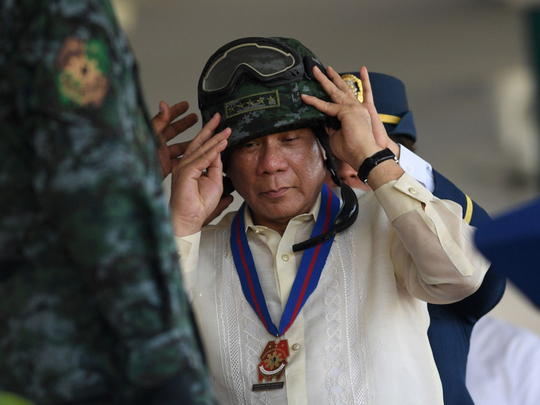
US Secretary of State Rex Tillerson went to Manila recently without making much of an issue of the drug war. Before his arrival, it was reported that he would bring it up with President Rodrigo Duterte. After the meeting, a Tillerson aide said that his boss had mentioned it to the Philippines president, but the statement sounded distinctly pro forma.
Duterte had his own version of the story. He told the press that the Americans and Australians (whose foreign minister also paid him a visit) are addressing the issue less and less and that they had touched upon human rights issues only “in passing.” He claimed they were mainly interested in discussing terrorism (in the context of the two allies’ support for the Philippine military’s ongoing fight against Daesh [self-proclaimed Islamic State of Iraq and the Levant] militants on the island of Mindanao).
Diplomats posted to Manila had received a tongue-lashing from the combative Duterte at the annual State of the Nation Address to Congress marking his first year in office. The European Union ambassador, the Philippine ombudsman and the country’s human rights commissioner — all of whom he has thundered against — were pointedly omitted from the list of invitees. His speech began not only with a reiteration of the need for the War on Drugs but also with a sweeping rejection of human rights and “western” concepts of punishment. It is a waste of time, he insisted, to jail rapists and drug offenders, only to release them after they’ve served time.
We can assume that diplomats have advised their ministers that bringing up human rights publicly with the president is bound to be unproductive. Duterte has repeatedly stated that the only acceptable way for foreigners to discuss human rights with him is to do it in private, if at all.
From the start of his presidency, Duterte offered his subordinates and the public absolution for the drug war. All responsibility, he vowed, would be his, personally. He has said time and again that anyone convicted in a court of law will receive a presidential pardon. That declaration offers the key for his success at gaining public consent for his war on drugs. He has placed himself above, and thus beyond, ordinary law, making himself the supreme law.
A further, related point needs to be made: Duterte has been careful to lay out a case to the public and his subordinates for a “just war” through the use of dossiers containing lists of officials and others he insists are drug lords, which he waves around during speeches. Some of these are explicitly identified; others are mentioned obliquely, suggesting that he is giving them a chance to mend their ways.
This method provides an alibi not only for himself but also for all officialdom. Here is political will in spades: assuming responsibility, reiterating the justness of his war, assuring everyone implicated that the president has their backs. Whether shocked or awed by the outcome, the country is assured of one thing: their collective innocence in what has transpired. And so the country can applaud the liquidations with a clear conscience.
The day after Tillerson left, having dispensed with the looming expectation of foreign criticism, Duterte was triumphant and uncompromising. Addressing the police during their anniversary celebrations, he said: “Find me a law . . . that says it is illegal to say those words, ‘I will kill you if you destroy my country and the youth of my land.’”
— The Washington Post
Manuel Quezon is a columnist for the Philippine Daily Inquirer newspaper and the host of the political affairs show “The Explainer” on the ABS-CBN TV news channel.










